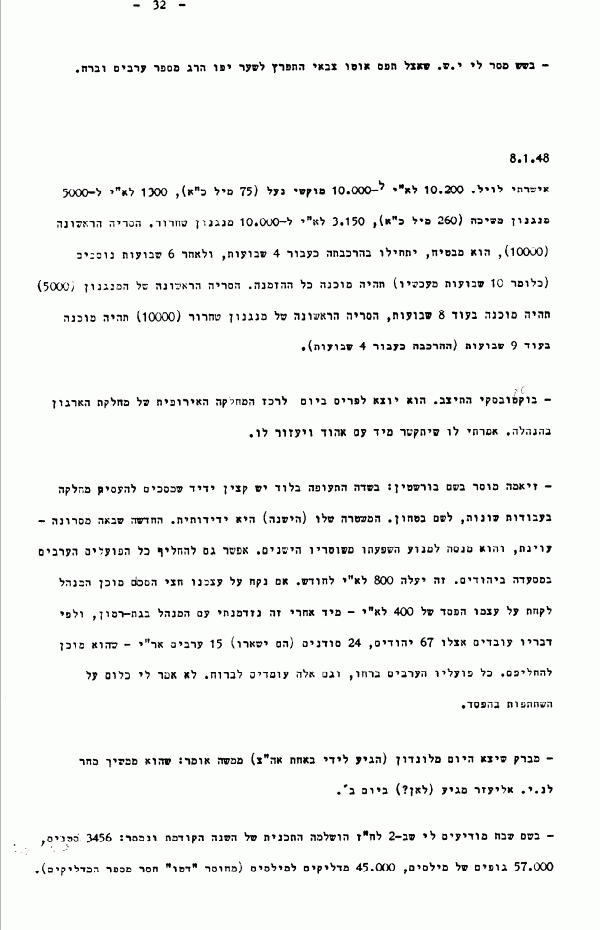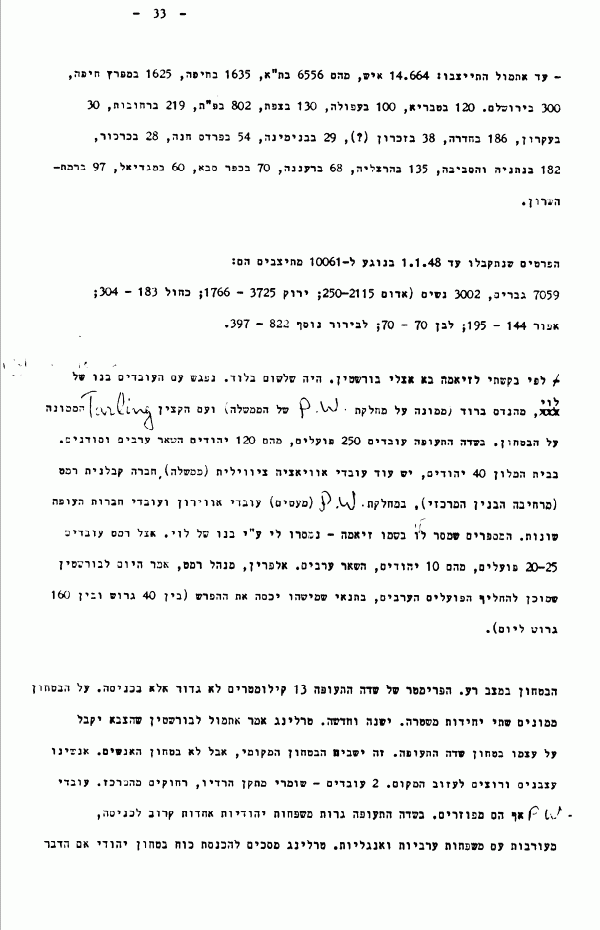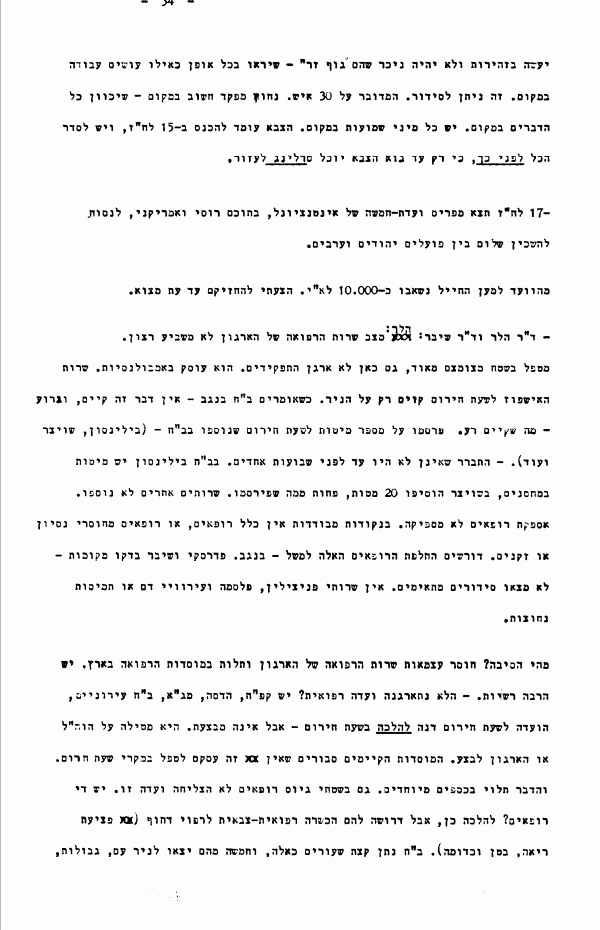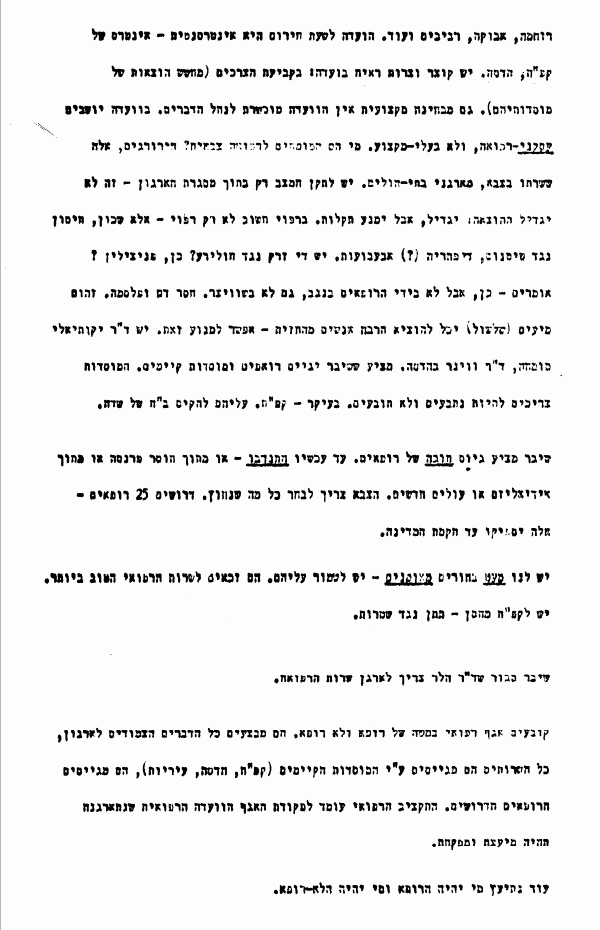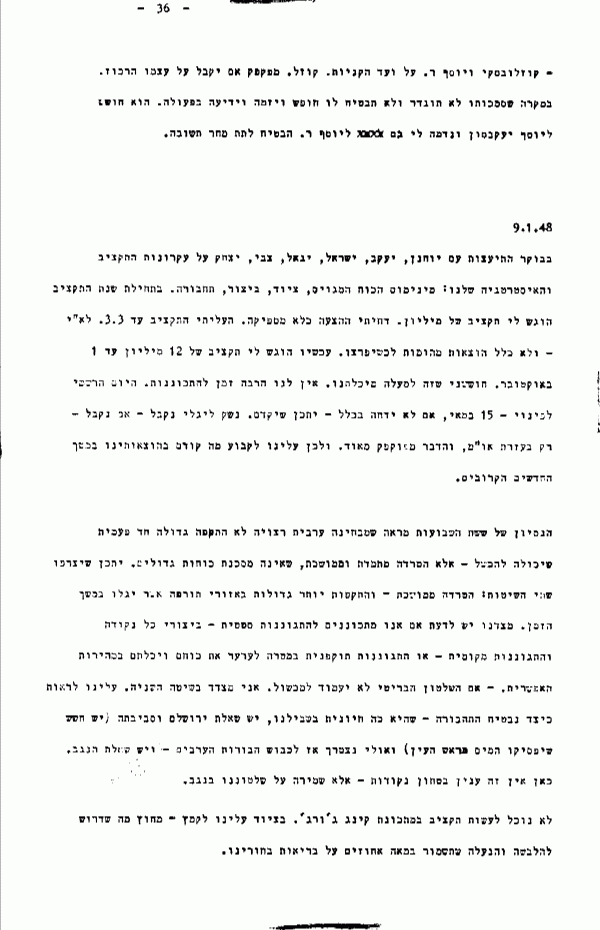1
of
Places:
Tverya
Paris
Lod
Sarona
Gat
London
New York
Haifa
Jerusalem
Karkur
Afula
Ekron
Safed
Magdiel
Netanya
Ramat HaSharon
Magen
Bet She'an
Gvulot
Revivim
People:
The use of the photograph is subject to the Copyright Law, 2007
08.01.1948
224816
[Thursday,] January 8, 1948 I authorized P£ 10,200 to Vilenchuk for 10,000 [should be 20,000] landmines (575 mil each), P£ 1,300 for 5,000 pull mechanisms (260 mil each), P£ 3,150 for 10,000 release mechanisms. He promises that they’ll start assembling the first series (10,000) in 4 weeks, and 6 weeks later (that is, 10 weeks from now) the entire order will be ready. The first series of the mechanism (5,000) will be ready in 8 weeks, the first series of the release mechanism (10,000) will be ready in nine weeks (the assembly 4 weeks later). – [Ya’akov] Botkovsky reported for duty. He is leaving for Paris to coordinate the European division of the Organization Department of the Executive. I told him to make contact immediately with Ehud [Avriel] and he’ll help him. – Ziama [Aran] conveys on behalf of [Yosef] Burstein: At the airport in Lod there’s a friendly officer who agrees to employ a platoon [of Haganah men] in various jobs for the sake of security. His police (the previous staff) is friendly. The new ones who came from Sarona [Base] – are hostile, and trying to prevent his being influenced by his former policemen. All the Arab workers in the restaurant can also be replaced with Jews. This will cost P£ 800 per month. If we take half of this amount on ourselves – the manager [Kurt Levy, owner of HaSharon Hotel and lessor of the restaurant] is willing to absorb the loss of P£ 400. Immediately after this I happened to meet with the manager at Gat-Rimon [Hotel]. According to him he has 67 Jewish employees, 24 Sudanese (they’ll stay), 15 Eretz-Israeli Arabs, whom he’s prepared to replace. All his Arab workers fled, and these ones too are going to flee. He said nothing to me [about] sharing the loss. – A cable from Moshe [Sharett] that was sent from London today (reached me at 1 p.m.) says that he is continuing to New York tomorrow. Eliezer [Kaplan] is arriving (where?) on Monday. – On behalf of Shevah [Slavin] I’m informed that on the 2nd of this month last year’s plan was completed and [the following] were delivered: 3,456 Stens, 57,000 bodies of Mills [grenades], 45,000 fuses for Mills (for lack of deto[nators], there’s a shortage in the number of fuses). – As of yesterday [the following] have reported for duty: 14,664 men, of whom 6,556 are in Tel Aviv, 1,635 in Haifa, 1,625 in Haifa Bay, 300 in Jerusalem, 120 in Tiberias, 100 in ‘Afula, 130 in Safed, 802 in P.T. [Petah Tikva], 219 in Rehovot, 30 in ‘Ekron, 186 in Hadera, 38 in Zikhron (?), 29 in Binyamina, 54 in Pardes Hannah, 28 in Karkur, 182 in Netanya and surroundings, 135 in Herzliya, 68 in Ra’anana, 70 in Kefar Saba, 50 in Magdiel, 97 in Ramat HaSharon. The details received as of January 1, 1948, regarding the 10,061 who reported for duty are: 7,059 men, 3,002 women (red 2,111 [men] – 250 [women]; green 3,725 – 1,766; blue 183 – 304; gray 144 – 195; white 70 – 70; to be determined 822 – 397[)]. – Per my request of Ziama, [Yosef] Burstein came to see me. He was in Lod two days ago. Met with the workers, with [Kurt] Levy’s son, with the engineer Brood [sp.] (in charge of the government’s P.W. [Public Works] Department), with Officer Terling [sp.], who’s in charge of security [at the airport]. There are 250 workers employed at the airport, 120 of them Jews, the rest Arabs and Sudanese. At the hotel there are 40 Jews, there are also employees in civilian aviation (government), the contracting company Ramet (expanding the central building), the P.W. Department (a few), employees of [the company] Aviron, and employees of various airline companies. The numbers he gave me on behalf of Ziama – were given to him by Levy’s son. RMT employs 20-25 workers, 10 of them Jews, the rest Arabs. Alperin [sp.], RMT’s director, told Burstein today that he’s willing to replace the Arab workers, on the condition that someone cover the difference (between 40 grush and 160 grush per day). Security [at the airport] is in bad shape. The airport’s perimeter, 13 kilometers, is unfenced except at the entrance. Two police units, an old one and a new one, are in charge of security. Yesterday Terling told Burstein that the army will take on responsibility for airport security. This will enhance local security, but not security for people. People are agitated and want to leave the place. Two workers – guards of the radio facility, are far from the center. The P.W. workers are also scattered. A few Jewish families live at the airport near the entrance, intermixed with Arab and English families. Terling agrees to the inclusion of a Jewish security force “if this is done carefully and it’s not apparent that they are a foreign body” – they should in any case look as if they work there. This can be arranged. It would be 30 men. Need to have an important commander at the site – to direct everything. There are all sorts of rumors going on there. The army’s going to enter on the 15th of this month, and everything needs to be arranged beforehand, because Terling can only help until the army arrives. – On the 17th of this month a committee of five from the International Trade Union [Confederation], including a Russian and American, will set out from Paris, to try to make peace between Jewish and Arab workers. – P£ 10,000 were drawn from the Committee for the Soldier. I suggested holding onto them until the time is right. – Dr. [Harry] Heller [of the Kupat Holim leadership] and Dr. Sheeber [Chaim Sheba]. Dr. Heller: The “Organization’s” Medical Service is not satisfactory. It handles a very narrow area, and even so it hasn’t sorted out its functions. It focuses on “ambulancing.” Emergency hospitalization services exist only on paper. When they talk about a hospital in the Negev – no such thing exists, and [even] worse – what does exist is bad. There were announcements about the number of emergency beds that were added within hospitals – (Beilinson [Petah Tikva], Schweitzer [Tiberias], and others). It turned out that they don’t exist (they still didn’t as of a few weeks ago). At Beilinson Hospital there are beds in warehouses, at Schweitzer Hospital 20 beds were added, fewer than announced. Other services have been added. The number of doctors is inadequate. In remote locations there are no doctors at all, or [there are only] inexperienced or old doctors. They demand that these doctors be replaced, for example – in the Negev. Padersky [Baruch Padeh] and Sheeber [Sheba] examined the sites – they didn’t find suitable arrangements: there are no services involving penicillin, plasma and blood transfusion, or necessary [chemical] solutions. What’s the reason? – The lack of independence on the part of the “Organization’s” Medical Service and dependence on the medical institutions in the country. There are many authorities. Hasn’t a medical committee been formed? – There’s Kupat Holim, there’s Hadassah, MDA [Magen David Adom], municipal hospitals. The Emergency Committee deals with emergencies in theory – but doesn’t execute. It tasks the National Council or the “Organization” [Haganah] with executing. The existing institutions don’t think it’s their duty to handle emergencies, and the issue depends on special funding. This committee has also been unsuccessful in the matter of enlisting doctors. Are there enough doctors? – In theory yes, but they need medical-military training in emergency care (lung, stomach, etc. injuries). The hospital gave a few lessons of this sort, and five of them set out to Nir-Am, Gvulot, Ruhama, Avuka [in Bet She’an Valley], Revivim, and elsewhere. The Emergency Committee is interest-driven – interests of Kupat Holim, of Hadassah. The committee is shortsighted and narrowminded in determining needs (for fear of expenses [that would fall to] their institutions). Also in terms of professionalism, the committee is not capable of handling matters. The committee comprises healthcare wheeler-dealers, rather than professionals. Who are the experts in military medicine? – Surgeons, those who served in the army, hospital organizers. The situation needs to be rectified only within the framework of the “Organization.” Won’t this increase expenses? – It will, but it will prevent malfunctions. Medical treatment requires not just treatment – but also housing, vaccination against tetanus, diphtheria (?), smallpox. Is there enough injection [serum] against cholera? – Yes. Penicillin? – They say – yes, but not in the hands of doctors in the Negev, nor at Schweitzer [Hospital]. Blood and plasma are lacking. Intestinal infection (diarrhea) can remove many men from the front – and this can be prevented. There’s an expert, Dr. Yekutieli, and Dr. Wiener at Hadassah. [Ben-Gurion] proposes that Sheeber [Sheba] enlist doctors and existing institutions. The institutions need to be the ones on whom demands are made, and not the ones making the demands. Especially – Kupat Holim. They need to establish a field hospital. Sheeber proposes mandatory conscription of doctors. To date they have volunteered – either for lack of income, or out of idealism, or as new immigrants. The army should select whatever it needs. [We] require 25 doctors; these will suffice until the state is established. We have few men who are trained – need to protect them. They deserve the best medical service. Kupat Holim has a warehouse – it will provide [equipment] in exchange for banknotes. Sheeber thinks that Dr. Heller should organize the Medical Service. They decided [to create] a medical branch in the Staff, comprising a doctor and a non-doctor. They’ll carry out everything connected with the “Organization.” They’re procuring all the services through the existing institutions (Kupat Holim, Hadassah, municipalities). They’re enlisting the necessary doctors. The medical budget is at the disposal of the branch. The Medical Committee [of the Yishuv] that has been formed will advise and supervise. We are still to consult as to who will be the doctor and who will be the non-doctor [in the branch]. – Kozlowski [Pinchas Sapir] and Yosef Rochel [Avidar] regarding the Procurement Committee: Kozlowski doubts whether he will take on the responsibility of coordination, in the event that his authority is not defined and he isn’t promised freedom and initiative, and knowledge of operations [?]. He’s concerned about Yosef Yaakovson, and I think also about Yosef R. [Rochel-Avidar]. He promised to give his answer tomorrow.





